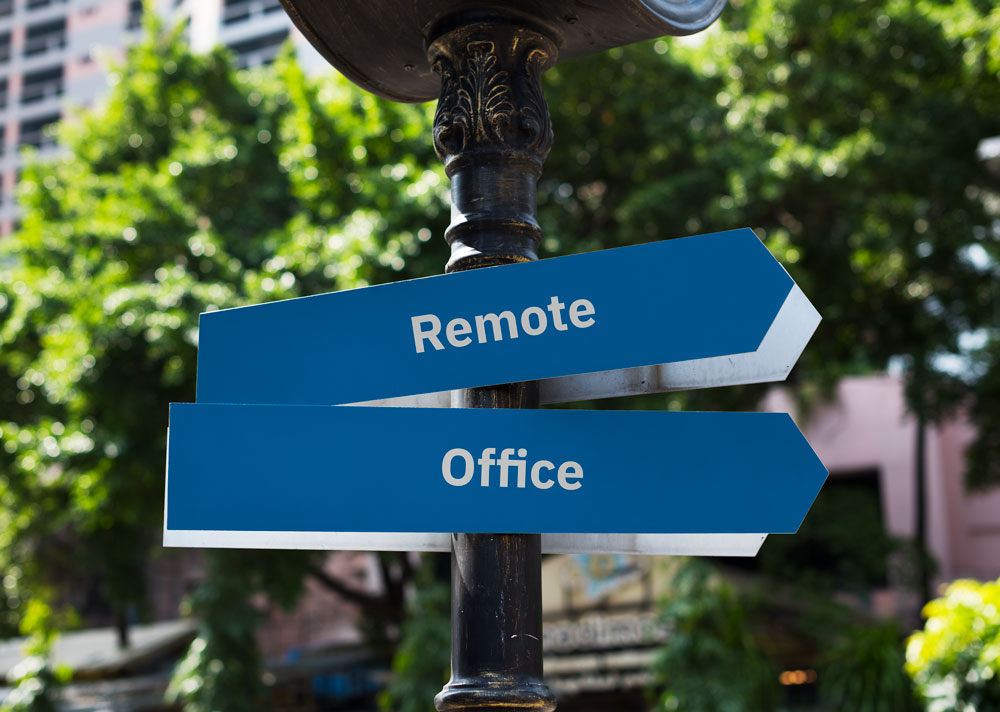
Why You Should Make the Switch to Remote Work
Modern employees have come to a crossroads. The rise of social mobility and an increase in the promotion of values such as freedom are forcing them to make a decision, to ask a question. “Should we stick to 9-to-5 office jobs or embrace remote work?”
If you do an internet search for remote jobs in a given area, you’ll likely get a hefty list of results. For example, “remote jobs Ukraine” 🇺🇦 returns a whopping 8,610,000 results. What does this tell you?
There’s definitely a place for remote work and a demand for remote workers. Yet, is it right for you? Before you can answer that, you’ve got to know what remote work is and what it isn’t. Let me walk you through my personal remote work journey and share what I’ve learned so far.
“Ok Google, What’s a Remote Job?”
A fancy dictionary such as Cambridge will tell you that remote work is “a situation in which an employee works mainly from home and communicates with the company by email and telephone.” The implications of this don’t quite hit the nail on the head for a couple of reasons.
One, remote employees work remotely on a regular basis with many being in 100% telecommuting roles. So it’s not really “a situation” as that dictionary definition stated.
Two, there are many communication channels available outside of email and telephone. Remote workers have a ton of messengers and video chat tools to choose from. (We happen to be fans of Telegram, while larger companies tend to use Slack.)
Do you see the differences between the formal (albeit misleading) definition and reality? Well, enough about differences. Let’s talk about similarity. Here it is.
Whether you work a traditional job or you work remotely, one thing remains the same—you’ve got things to do. In remote roles, you still have compulsory tasks and responsibilities to care for, professional development to focus on, and teammates to communicate with despite not being in an office.
You now have a clearer picture of what remote work is. I’d be cheating you, though, if I didn’t also tell you what it is not.
The Truth About Remote Work & Freelancing

Remote work and freelancing are often associated with one another. So many think that they are one and the same and, as a result, shy away from remote work. Why?
Well, I was raised in a traditional middle-class Ukrainian family. If you’re anything like me, you’ve been taught that finding a stable job is extremely important. And, of course, freelancing is probably the last thing that comes to mind when you hear the word “stability”. So if you thought that remote work and freelancing were the same, you might’ve written off the possibility of telecommuting.
The good news is that remote jobs are not always freelance jobs. A freelancer is defined as “a self-employed person providing services to businesses on own choice, but who is not committed to any employer in the long-term.” So, yes, you can be self-employed and work remotely. However, our modern world also affords you the opportunity to work remotely and get hired as an employee with all the perks and benefits that come with it.
No more worries about getting lectured by your family for being “irresponsible”! But still, the question remains: Is a remote job right for you?
You Never Know Until You Try
Many lively arguments take place—especially among the youngsters—for and against remote jobs. GFK Ukraine, a respected sociological research company, claimed that, as of 2016, remote work occupation was at 21% and growing. Despite that, the topic is still controversial. There’s no way to get a straight answer on whether it’s good or bad, whether it boosts or ruins productivity.
And since Ukraine is trailing behind the western world in terms of embracing remote work, you may choose to dismiss it altogether and continue on the traditional route. However, before you give up on the idea of telecommuting, why not give it a fair shake and consider the pros and cons?
The Pros of Remote Work
Here are three reasons, based on my personal experience, why you should consider a remote job.
- Flexibility. When working remotely, it’s not uncommon for management to be less direct and assertive. In most cases, you’re given a task, a checklist, and a deadline and left to your own devices. When, how, and where you complete the work is up to you as long as it’s done according to company standards and submitted on time. Are you wondering how that’s a benefit?
Let me put it this way. You can work anytime—at 6 in the morning or 11 at night. And if you believe in the Pareto principle you can skip working time in its traditional interpretation altogether. And need I mention that you can also work from anywhere. You can work from your bed while wearing your favorite pajamas with the jam stain on the front. Or from that cozy little cafe down the street. It’s totally up to you as long as you get the job done right.
- More Free Time. Does your daily routine go this way—home, work, bar, home, rinse, repeat? If you’re over the “groundhog day” grind and want to take control of your life, the remote is the way to go. You can take a noon yoga class, attend university, do volunteer work, or pretty much anything else by landing a remote job. Would you like to broaden and enhance your life?
- Professional Development. As a remote worker, you can’t turn to the person at the desk next to yours to ask a question. You can’t lean on others to help you work through the daily issues that inevitably come up, which will test and expand the limits of your resourcefulness. Google will become your best friend as you learn to get answers fast so you can implement solutions and continue working.
Additionally, you’ll learn how to be your own manager, prioritizing tasks, estimating the time needed, and evaluating quality before submitting your work.
These skills will make you a hot commodity in the job market. After all, just about every employer will tell you that “babysitter” is not a part of their job description.
The Cons of Remote Work
Now for a few reasons a remote job might not be the best fit for you.
- Flexibility. Didn’t I just say this was a pro? Yes, but it’s a pro and a con at the same time. Of course, it’s good because it puts you in the driver’s seat, but that’s also why it can be a bad thing. There’s no one to hold you accountable on those days when you just can’t get it together and are procrastinating like there’s no tomorrow.
You are solely responsible for your work. So when things go wrong, there’s no one else to blame. It’s all on you and that might be a tough pill to swallow.
- Less Engagement. Sure, you’ll be interacting with your coworkers and managers, perhaps even gathering regularly to discuss project details and toss around ideas. But it’s much harder to stay in the loop and to keep team spirit alive when you don’t operate in the same space and converse by the water cooler during lunch. Virtual office spaces just don’t compare.
So you’re more or less an individual unit with a thin wire attaching you to other units—your teammates.
- Less Socialization. I suppose it’s good not to have the burden of unwanted company and office drama. But, if you choose to work at home, you might find yourself going little nuts sometimes due to the lack of social interaction. And you’ll miss out on those hilarious inside jokes that office workers enjoy. Bummer!
Not to mention that since no one will see you in the daylight, you might start to…let go and care less about your personal appearance.
Make Your Choice

As you can see, there’s a lot to take into account. But remember that life is never black and white, and the same is true of work. No one else can say if a remote job will be right for you in the long-term. It’s up to you to decide whether it will enhance your life.
It’s the same decision I had to make. I was lucky enough to experience part-time remote work while pursuing my BA. So I had a taste of it before feeling comfortable enough to jump in headlong and work remotely full-time. Personally, I feel that telecommuting is the only way I can handle full-time and still enjoy life without compromise. It works for me. Will it work for you?